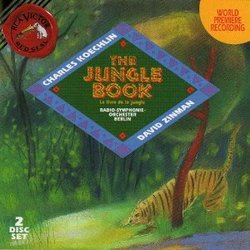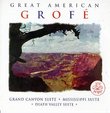| All Artists: Koechlin, Zinman Title: Jungle Book Members Wishing: 0 Total Copies: 0 Label: RCA Release Date: 5/10/1994 Genres: Pop, Classical Styles: Easy Listening, Historical Periods, Modern, 20th, & 21st Century Number of Discs: 2 SwapaCD Credits: 2 UPC: 090266195527 |
Search - Koechlin, Zinman :: Jungle Book
 | Koechlin, Zinman Jungle Book Genres: Pop, Classical
|
Larger Image |
CD DetailsSimilarly Requested CDs |
CD ReviewsNeglected Masterpieces Joshua Grasso | Oxford, OH USA | 08/16/2003 (5 out of 5 stars) "Simply put, I adore these works. Koechlin is a composer I only stumbled onto recently, in a wonderful disc of works for bassoon and orchestra/piano (highly recommended). His works for Kipling's The Jungle Book are some of the most original and compelling music of the 20th century (no hyperbole intended). Kipling's work obviously fascinated Koechlin, who wrote his first Jungle Book piece, a set of three orchestral songs, early in his career, and continued throughout his life writing piece after piece to capture its music. It's not guaranteed to please, however; Koechlin's sound world is highly unique, and he never pushes the big effect, preferring to explore the more spectral range of the orchestra. The result is a haunting and searching score, but one that is extremely powerful and compelling.The three songs are very Debussy-ish without being overtly derivative. The first one in particularly is incredibly beautiful, the other two relying more on orchestration and atmopshere (Koechlin is a master orchestrator). Things really get exciting with The Spring Running, a set of pieces which deserve careful listening, though they sound great the first time around. The second disc, in my opinion, is the highlight of the set, as each piece builds on and complements the previous one. The Meditation of Purun Bhagat begins with a slow ruminiation that gradually achieves transcendence. The Law of the Jungle is something like Ravel's Bolero (though you couldn't dance to it), in its ability to raise repitition to an art form. And finally, you come to Les Bandar-log, the most exciting, bewildering, dazzling piece I've heard from Koechlin. I can't say anything about this piece...but there's a whole world inside it. I can understand why these works aren't in great demand in the concert halls, but on disc, they should have a long and prosperous life. Highly recommended for its originality, beauty, and most of all, shameful neglect!" Evolving Masterpiece B. J. E. Swindell | Herts., UK | 12/20/2005 (5 out of 5 stars) "It is only recently that I have actually heard any music by Koechlin. Until then, he was just another minor French composer (a bit like Rubbra and Finzi, though they are at last becoming better known, and not before time). The music I heard was The Spring Running, which I heard on Radio 3 whilst driving to my daughter's school. So, it may be that at last Koechlin is getting recognition too. I found Spring Running so interesting that I bought the CD set featured above. However, since hearing the entire Jungle Book, my favourite section is now the three songs that begin the work (op 18). And what fine songs they are. Whereas the orchestral tone poems (?) are sometimes discursive, the songs are focussed, evocative. Not only Debussy but also Schoenberg (esp. Gurrelieder) and even Strauss are hinted at to my mind. Although only a personal opinion, my favourite song is probably the "Chant de Kala Nag". There is a song, I think by M People, called "Look for the Hero inside yourself", and I think Johan Botha, with his fine heldentenor style, brought out the suppressed hero inside Kala Nag. Wonderful stuff, from the almost ruminative "Je me souviens de qui je fus..." to the fine climax at "aux gites verts des taillis clos!", to be repeated at "...sans maitre!", Botha really shows what lies closest to Kala Nag's heart." A Unique Orchestral Experience D. A Wend | Buffalo Grove, IL USA | 03/06/2007 (5 out of 5 stars) "This recording is the World Premiere of Charles Koechlin's Jungle Book and received the Orchestral Gramophone Award and was, memorably, accepted by the son of the composer. Charles Koechlin loved Rudyard Kipling's The Jungle Book and set different parts of the book to music at various points in his career. The first of these - The Three Poems - bear the titles: Seal Lullaby, Night Song in the Jungle and Song of Kala Nag, with texts from The Jungle Book. The music, scored during 1904 - 04, is exotic and evocative. The lullaby mimics the gently lapping of waves as the soprano and chorus spin a soothing tapestry of sound. The Night-Song in the Jungle had a cadence that suggests movement (sung by the soprano, tenor, baritone and chorus) and is a song of well-wishing to the animals of the night. The Song of Kala Nag is a lament of an elephant that has been tamed for his old life in the jungle, sung by the tenor. The poem describes a night in the year when all of the elephants gather to dance together and, rather than being somber, the music is triumphant as the elephant recounts his past freedom and vows to have it again.
The Spring Running was written during 1925 - 27 and has four sections: Spring in the Forest, Mowgli, The Running and Night. These are atmospheric pictures of the final part of Kipling's book where Mowgli leaves the jungle for the world of humans. The series of tone poems relate how Mowgli is taught the laws of the jungle by the tiger Bagheera and the bear Baloo. The Mowgli section is particularly descriptive of a young man discovering the jungle and is beautifully scored to describe the awe of the unfamiliar and The Running beautifully describes life in the jungle. The Meditiation of Purun Bhagat was longer in the writing having been attempted from 1903 and 1923 and finally completed in 1936. This tone poem describes Purun Bhagat who was a powerful politician and becomes a pilgrim and saves a village from destruction. It is an atmospheric piece the gradually builds from a long, meditative melody to a fortissimo climax, then returns to the serenity that began the movement. The last pieces, The Law of the Jungle and Les Bandar-log, were written together. The Law of the Jungle is the reciting of the laws by Baloo the bear and sounds like a sing-song pronouncing of the laws, each capped by a gong. Les Bandaar-log are a group of noisy monkeys that live atop the trees and are disliked by the other jungle residents as being loudmouthed. The final tone poem begins quietly, as if the sun is rising over the jungle. After this quiet introduction, the monkeys are described with the use of jagged rhythms that develop into contrasting melodies. This is very expressive music that beautifully conveys the atmosphere of Kipling's Jungle Book. The performance by the Radio-Symphonie-Orchester Berlin is beautifully played and certainly a labor of love for David Zinman. The recording is nicely balanced and captures each nuance of this expressive music. " |

 Track Listings (7) - Disc #1
Track Listings (7) - Disc #1